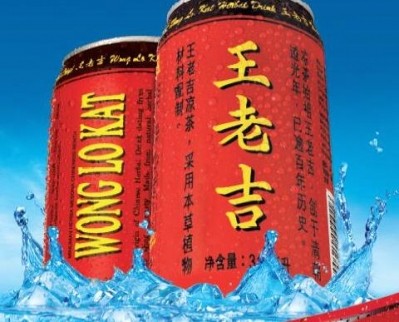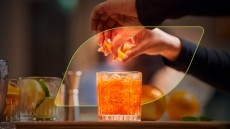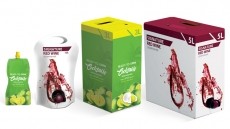‘Our RTD tea will taste of tea. Not sugar. Not malic acid!’ Ex-Coke exec says it’s time for Tg…

“Our product will taste of tea. It won’t taste of sugar. It won’t taste of malic acid. Because that’s what Lipton add to give their green tea extract a tea taste. So we wanted to lean a bit on tea heritage and then deliver then some of its goodness,” she tells BeverageDaily.com.
“The focus for us is positioning it as healthy refreshment and not to gouge people’s eyes out on price,” Nadur, who is founder & director, Ideas 2 Launch/Tg, adds, glossing Tg’s RRP of £1.39 ($2.10) per 330ml PET bottle of tea, containing only 30 calories and 7g of sugar, and made using real green tea leaves.
Unilever, Coke, Mondelez and now Tg!
Nadur – who also held senior positions at Mondelez and Unilever – explains why her self-financed brand can tap rising UK demand for green tea, after 2014 value sales in Tesco alone doubled, and why it’s taken the category so long to take off, after sluggish growth vis-à-vis the rest of the world.
“I think there are two issues. One is that the kind of products that have been available in the UK market have been primarily what I’d call ‘tea flavored sodas’, driven by Lipton,” she says.
“It’s been primarily tea-flavored sugary drinks sitting just adjacent to the carbonated soft drinks aisle. So consumers have for a long time not drawn it out as being different or unique. The second thing is that the products that are coming – new entrants to the market – are still at the sugary end."
“So you’ve got the US brand Arizona, which is high sugar, then a few other products using tea as an ingredient but not calling out, specifically, the tea benefits. So just using it as an ingredient, as you would vitamins or caffeine.” Nadur says.
Reaching the 'nirvana space' for RTD teas
Discussing what she calls the “nirvana space” for RTD iced teas, which rests on their true health credentials, Nadur says that UK under-35s are finally adopting green tea as a “holistic drink”.
“So it’s not just a juice drink or a soft drink with a bit of tea in it, but green tea as a product – this is what’s really capturing the imagination of millennials – you can see that on hot tea retail shelves, which are yielding more space to green teas versus black.”
The other trend, Nadur adds, is people looking for innately functional drinks – in her words, “products where you don’t need to add stuff to pretend it’s healthy, it’s innately so”.
“So green tea is one hero, coconut water is another, aloe drinks are also seen as something innately beneficial, that doesn’t need other additives.

With this holistic appeal in mind, Nadur insists it’s realistic for RTD teas to gain a 2-3% share of the UK soft drinks market, which would value the category at circa. £300m.
“We’re not talking this year, we’re not talking next year – but this is a mid-term trend. If you look at juice drinks the numbers are awful,” she says.
People jumping out of juice...
“People are leaving that category in droves, despite what Tropicana, Innocent and those guys will do this year to try and create a positive message. Consumers are thinking, ‘Oh, Maybe I should just eat fruit instead, rather than drinking juice drinks!’
“So retailers are going to have to reshape the category. I’ve been talking to a couple of major multiples, and they are looking at reshaping their aisles.
“That, as you know, will help drive how people shop in the future. Right now there’s no RTD tea category on the shelves, but in six or eight months that will change, and we’ll see more of a segment carved out to help consumers navigate to a healthier space on shelves.”
Nadur says the major UK retailers have been receptive to Tg thus far, and the brand expects listings shortly ahead of an April launch – after supermarket planograms are updated at the end of March.
Despite her successful FMCG career and the contacts she gained, Nadur says the worst thing about being a start-up is that big agencies and companies are unwilling to work with you due to your budget.
“I’ve had to become quite creative to find independent people and smaller companies, which are actually more valuable, because you don’t have these layers of bureaucracy and ‘client management’, which stifles a lot of creativity in my view,” she says.
The biggest bugbear for startups?
“That’s the biggest bugbear for start-ups, irrespective of how well you know the industry. The good things? We’re not an oil tanker. We can turn this category around, and work faster than a lot of companies I’ve worked for in the past.”
While she believes RTD teas have huge market potential, particularly outside the UK, Nadur says she is keen to seize the challenge in this market, and has high hopes for the Tg brand.
“I think this will be a much bigger brand long-term. And I don’t think it will take 10 years, as per Innocent. You have to consider two things. One is that consumers are impatient, and won’t wait 10 years for a category to emerge,” she says.
“Secondly, there’s a lot more cash and openness from industry players to create joint ventures – a lot more awareness that startups have something good that they can exploit faster than just waiting for someone to spend 10 years building a brand.”
Big brands seek startup inspiration
Unilever has put feelers out in the industry looking for technology and brand solutions from startups, Nadur says, while Suntory, Coke and Danone are doing the same.
Explaining Tg’s flavor choices: Green Tea with Ginseng, Green Tea with Mandarin & Ginseng, Green Tea with Jujube & Ginseng, Mandarin and Ginseng, Nadur says she and her business partner Dr Hua He chose ingredients with a history of ancient Chinese use.
“People will probably come from water (which they see as a bit boring) and squash into this category, so it’s important to have a mandarin citrusy flavour, to attract and not alienate people,” she says.
“People will also come from more juice-like drinks and soda, and I don’t want to deliver a product with added juice and the hidden sugars in them. So we’ve used the super fruit jujube, which has a huge amount of properties. It’s a new flavor, but with a familiar taste profile – it will work well.”



















